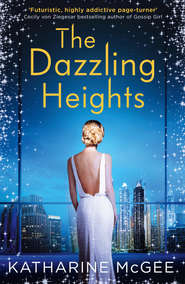По всем вопросам обращайтесь на: info@litportal.ru
(©) 2003-2025.
✖
The Towering Sky
Настройки чтения
Размер шрифта
Высота строк
Поля
She hoped they would forgive her for what she was about to do. But she didn’t have a choice. It was either this, or go on leading a shriveled, starved, half life: a life deprived of the only person who made it worth living. She felt a pang of guilt, but even stronger was her profound sense of relief, that at least—at last—it would soon be over.
The girl reached up to wipe at her eyes, as if the wind had stung them to tears.
“I’m sorry,” she said, though there was no one around to hear. Who was she talking to, anyway? Maybe the city below her or the entire world or her own quiet conscience.
And what did it matter? New York would go on with or without her, the same as ever, just as loud and electric and raucous and bright. New York didn’t care that those were the last words Avery Fuller ever spoke.
AVERY (#ulink_0ddc0dc7-8bbc-5eb6-bec3-f444fe48cc5f)
Three months earlier
AVERY DRUMMED HER fingers restlessly on the armrest of her family’s chopper. She felt her boyfriend’s gaze on her and glanced up. “Why are you looking at me like that?” she asked, teasing.
“Like what? Like I want to kiss you?” Max answered his own question by leaning over to drop a kiss on her lips. “You may not realize it, Avery, but I always want to kiss you.”
“Please prepare yourselves for the final approach to New York,” the chopper’s autopilot cut in, projecting the words through unseen speakers. Not that Avery needed the update; she’d been tracking their progress this entire trip.
“You okay?” Max’s eyes were warm on hers.
Avery shifted, struggling to explain. The last thing she wanted was for Max to think she was anxious about him. “It’s just . . . so much happened while I was gone.” It had been a long time. Seven months, the longest she’d ever spent away from New York in all her eighteen years.
“Including me.” Max gave a conspiratorial grin.
“Especially you,” Avery told him, mirroring his smile.
The Tower swam up rapidly to dominate the view through their flexiglass windows. Avery had seen it from this perspective plenty of times—all those years of traveling with her family, or with her friend Eris and her parents—but she’d never before noticed how much it looked like a massive chrome headstone. Like Eris’s headstone.
Avery shoved that thought aside. She focused instead on the autumn sunlight dancing over the choppy surface of the river, burnishing the golden torch of the Statue of Liberty, which once seemed so tall but now was absurdly dwarfed by its great neighbor, the thousand-story megatower that sprouted from the concrete surface of Manhattan. The Tower that her father’s company had helped build, in which the Fullers occupied the top floor, the highest penthouse in the entire world.
Avery let her gaze swoop to the boats and autocars buzzing below, the monorails suspended in the air as delicately as strands of spider’s silk.
She’d left New York in February, soon after the launch of her father’s new vertical living complex in Dubai. That was the night when she and Atlas had decided that they couldn’t be together, no matter how much they loved each other. Because even though they weren’t related by blood, Atlas was Avery’s adopted brother.
Avery had thought then that her entire world was shattered. Or maybe she herself was shattered—into so many infinitesimally small pieces that she’d become the character from the nursery rhyme, the one who could never be put back together. She had been certain she would die from the pain of it.
How foolish she’d been, to think that a broken heart would kill her, but it was how she’d felt.
Yet hearts are funny, stubborn, elastic little organs. When she didn’t die after all, Avery realized that she wanted to leave—to get away from New York, with its painful memories and familiar faces. Just as Atlas had.
She had already applied to Oxford’s summer program; now she simply pinged the admissions office and asked if she could transfer early, in time for the spring semester. She met with the dean at Berkeley Academy to request high school credit for Oxford’s college courses. Of course they all agreed. As if anyone would say no to Pierson Fuller’s daughter.
The only source of resistance, surprisingly enough, was Pierson himself.
“What’s this about, Avery?” he’d demanded, when she came to him with her transfer papers.
“I need to leave. To go somewhere far away, somewhere completely free of memories.”
Her father’s eyes darkened. “I know you miss her, but this feels extreme.”
Of course. He assumed that this was about Eris’s death. And it was, in part—but Avery was grieving Atlas too.
“I just need some time away from Berkeley. Everyone stares at me in the halls, whispering about me,” she insisted, telling the truth. “I just want to get away. To somewhere no one knows me, and I don’t know them.”
“They know you all over the world, Avery. Or if they don’t yet, they will soon enough,” her father said softly. “I was going to tell you—I’m running for mayor of New York this year.”
Avery stared at him for a moment in mute shock. Though she shouldn’t really have been surprised. Her father was never satisfied with what he had. Now that he was the richest man in the city, of course he would want to be the most prominent too.
“You’ll be back next fall, for the election,” Pierson told her. It wasn’t a question.
“So I can go?” Avery asked, her chest seizing with a violent, almost nauseous relief.
Her father sighed and began to sign her permission papers. “Someday, Avery, you’ll learn that it’s not much use running away from things if you have to eventually come back and face them.”
The next week, Avery and a jostling band of mover-bots made their way down the narrow streets of Oxford. The dorms had been full midsemester, but Avery posted an anonymous ad to the school discussion boards, and found a room in an off-campus cottage with a delightfully overgrown square of garden out back. It even came with a roommate, a poetry student named Neha. And, it turned out, a house full of boys next door.
Avery slid easily into Oxford life. She loved how unmodern everything felt: the way her professors wrote on green boards with funny white stencils; the way people actually looked at her when they spoke, rather than letting their eyes slide constantly toward the edge of their vision to check the feeds. Most people here didn’t even own the computerized contacts Avery had grown up using. The linkages in Oxford were so weak that Avery had ended up taking hers out too, living like a premodern human with nothing but a tablet to communicate. Her vision felt delightfully raw and unencumbered.
One evening as she worked on an essay for her East Asian art class, Avery was distracted by noises from next door. Her neighbors were having a party.
Back in New York, she would simply have turned on her silencer: the device that blocked incoming sound waves, creating a little pocket of quiet even in the loudest places. Actually, this wouldn’t have happened in New York, because in New York Avery didn’t have next-door neighbors, just the sky stretching out from the Fuller apartment on all sides.
She cupped her hands into earmuffs over her ears, trying to focus, but the raucous shouts and laughter grew even louder. Finally she stood up and marched next door, not caring that she was wearing athletic shorts, her honey-colored hair piled atop her head and fastened with a turtle-shaped clip that Eris had given her years ago.
That was when she saw Max.
He stood at the center of a group in the backyard, telling a story with animated fervor. He had shaggy dark hair that stuck out in all directions and wore a blue sweater paired with blue jeans, something the girls back home would have teased him mercilessly for. But Avery saw it as a sign of his elemental impatience, as if he was too preoccupied to be bothered by something as mundane as clothes.
She felt suddenly ridiculous. What had she been planning to do, come over here and scold her neighbors for having fun? She retreated a step—just as the boy telling the story looked up, directly into her eyes. He smiled knowingly. Then his gaze slid past her, and he kept talking without a break in narrative thread.
Avery was startled by the flash of irritation she felt. She wasn’t accustomed to being ignored.
“Of course I would vote for the referendum, if I could vote here,” the boy was saying. He had a German accent, his voice sliding up and down along a wild range of emotion. “London must expand upward. A city is a living thing; if it doesn’t grow, it withers and dies.”
He was talking about her dad’s bill, Avery realized. After years of lobbying the British Parliament, Pierson Fuller had finally gotten his nationwide referendum, to determine whether Britain would tear down their capital city and rebuild it as a massive supertower. So many cities around the world had already done so—Rio, Hong Kong, Beijing, Dubai, and of course New York first of all, two decades ago—but some of the older European cities were more reluctant.
“I would vote no,” Avery butted in. It wasn’t the most popular opinion among young people, and her dad would have been appalled, but she felt a perverse desire to grab this boy’s attention. And, anyway, it was the truth.
He gave an ironic, half-foreign bow in her direction, inviting her to continue.
“It’s just that London wouldn’t feel like London anymore,” Avery went on. It would become another of her dad’s sleek automated cities, another vertical sea of anonymity.
The boy’s eyes crinkled pleasantly when he smiled. “Have you seen the proposal? There are battalions of architects and designers to make sure that the feeling of London is preserved, that it’s better than before, even.”
“But it never really turns out like that. When you’re in a tower, there’s less sense of connection, of spontaneity. Less of”—she held out her hands a little helplessly—“of this.”
“Party crashing? For some reason, I think people do that in skyscrapers just fine.”
Avery knew she should be flushing with embarrassment, but instead she burst out laughing.







